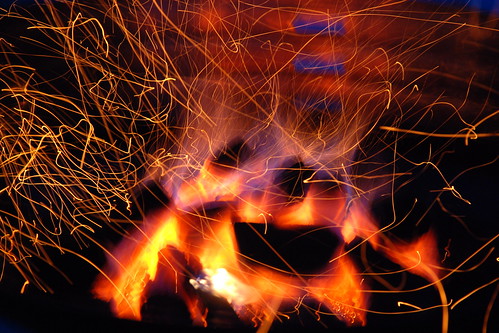
The following is part of a series on Hell, partially as a response to the Love Wins controversy. To catch up, go here.
As I stated in the first post, this section will be mostly based on Sharon Baker’s Razing Hell.
———————-
Hell Yes. Hell No! Or Who the Hell Cares?
Otto the Non-Believer at the Final Judgment
Baker invites readers to imagine a man named Otto: “an international leader who has launched preemptive wars and terrorized nations with his arrogant dominance, leading to the death of thousands upon thousands of men, women, and children” (115). Otto stands in God’s throne room on the final Day, not a Christian. He anticipates that God is going to give him his due for all the wrongs committed and therefore hates this God. As he approaches God, the heat from the flames of love gets hot. Baker explains:
His anger and rebellion turn to sheer terror. He moves closer to the flames, and as he does so, he realizes that the blazing fire is God. The closer he gets to God, the more deeply he feels, not God’s hatred or judgment, but God’s love. It is a love of such magnitude that, with its abundance, it act as wrath, judging him for his deficiency, and with its purity, it serves as a hell, punishing him for his depravity. God’s love and mercy, both acting as judgment, are so extravagant, so abundant, so incomprehensible that they completely overwhelm Otto. Then he hears a voice from that fire. He does not hear, “You evil, vile murderer! I am going to get you now. Revenge, punishment, and torture forever and ever!” Instead, he hears God say with sorrow forged from love, “I have loved you with an everlasting love. But look at your life; what have you done?” (115-116).
The fires of God’s love are more wrathful than the angry God of many theologies. Judgment continues for Otto:
Totally undone by God’s unorthodox approach, auto falls to his face, still afraid but with his hatred replaced by remorse. As his life flashes before his eyes, he sees all the victims, mothers crying for lost sons, children begging for the return of their murdered fathers, 18-year-old boy dying alone on the battlefield, crying for his mother… He looks to his right and sees his victims. Still in the fire, God makes him go to each one and lay his hand upon their hearts. As he does so, he feels all of their pain, all of their disappointments, all of their fear, and knows that he has caused it all. Within the crowd of victims, the last one he has left to touch, he sees Jesus (116).
At this point Otto touches Jesus’ heart and feels the totality of Christ’s pain because of sin. “All the while the fire of God burns, devouring Otto’s wickedness and evil… and he cries out in utter remorse, in unmitigated repentance” (Ibid.). The pain of judgment through love leads to the ultimate vindication of his victims, including Jesus. God’s offer of forgiveness extends to Otto and he accepts, having been purged by God’s wrath and reconciled to those he hurt. Otto is now fit for the resurrection reality in the renewed creation.
Lest one accuse Baker of some sort of purgatorial universalism, she emphasizes that Otto’s free will (and God’s non-coercive nature) demands that Otto can deny God’s offer of forgiveness through loving wrath. Some will refuse to feel the full weight of the evil within them and won’t turn to Jesus. Without Christ they have nothing good, and this overwhelming love consumes them until there is absolutely nothing left. Body and soul then will be dead, forever. The fire that purges will show that there is nothing left that is fit for the new creation reality, and they will essentially experience the “lake of fire,” which is utter annihilation. This is hell (117).











